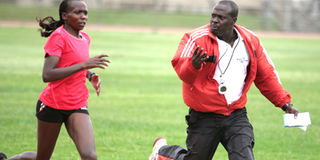Behind every gold medal, there’s a coach

National athletics coach Julius Kirwa trains Sylvia Kibet at the Nyayo National Stadium. Photo/ FILE
As the athletes stole the limelight on arrival, some unsung heroes of Kenya’s five gold, five silver and four bronze medals at the Beijing Olympics occupied their usual place: behind the scenes.
Cameras were trained on captain Wilfred Bungei, who lifted Kenya’s flag high as he led other athletes off an Emirates Airline from Dubai. He was the man of the moment, together with marathoner Samuel Wanjiru, steeplechaser Brimin Kipruto and four lap race champion Nancy Jebet Lagat.
From behind the athletes was the unassuming coach Julius Kirwa, 49. He had a smile all right, but tried to keep off the limelight. His job was done; the medal haul told it all.
It took the Nation three hours to catch up with the Armed Forces coach at the reception for the athletes at Simba Restaurant on the fifth floor of the Kenya Airways offices. Even then, Kirwa loudly wondered why there was some interest in him.
But with all the microphones thrust at him, he had no way out. “It takes long to train any winning athlete. We’ve followed some of these athletes from the time they were in primary school,” he explained.
But what did it take to turn Kenya’s fortunes in Beijing? Kirwa acknowledges he had sleepless nights with his colleagues, planning the races. “It’s not as easy as it looks on TV. Everything is planned to the last detail. The job is made harder because you have to read the minds of the other coaches,” Kirwa said.
He is hard on his athletes, but Kirwa, who holds an IAAF diploma in coaching, does not believe in interference in his training programmes. “You’ve to let the coach do his work,” he says, adding that Kenya’s success came from training in similar conditions to the ones in Beijing. “We trained at 1pm when it was hot in Ngong, Athi River and in Nairobi.”
Kirwa is aware of the abundant talent in Kenya. “According to the rules, the first two finishers automatically qualified for Beijing. But any athlete from number one to 10 is equally good. Some of the athletes may not be at their best during trials, but their records speak volumes, which is why sometimes we take the blame. Definitely, a coach would not make a wrong decision because of what is at stake,” he explains.
One coaching term which keeps cropping up during the interview is “mileage accumulation”; this is the amount of mileage a Kenyan athlete accumulates from the time they are born to when they start competing. He explains that Kenyan athletes are naturally gifted. “Some have to run to school everyday and the talent can be spotted at an early stage.”
The chemistry between a coach and an athlete can spell doom or success. Samuel Wanjiru, the first Kenyan gold medallist in men’s marathon admits that he has faith in his coach. “We’ve been with some of these coaches from the time we were young and have a lot of faith in them. I always listen to the coach and other athletes will tell you so,” Wanjiru says with a smile.
Nancy Jebet surprised Kenyans by winning a gold medal in the 1,500 metres, destroying a classy field. Kirwa was not surprised: “She had the potential and peaked at the right time. It was a difficult decision because we felt she had a better chance in 800 metres.
But the man who has helped Kenya rein supreme on the track since 2002 Edmonton World Championship, is expected to go home empty-handed. When he took the team to Osaka last year for the World Championship, he was rewarded with a cheque of Sh5,000, even as his athletes pocketed millions. Again after another great performance in Beijing, he is reluctant to meet his family; they wonder what makes him hang on to a job that does not put food on the table.
“When I came from Osaka, my wife wanted us to buy a grade cow. She thought her worries would be over. I gave her the Sh5,000 in the envelope handed to me by the Government,” he said.
A normal day sees him running besides athletes and shouting instructions during daily work-outs, for Kirwa is a firm leader. To him, this is just another day at work.
It is only after seeing the workload athletes put in that one appreciates success does not come easily. Although Kirwa has been one of the most successful athletics coaches in Kenya, he does not have any international title to his name.
The father of two boys and five girls developed early liking of the sport while at Kamoywa primary school in Nandi District, and started running competitively at Kabiyet Secondary School. “Since primary school, I always wanted to be among the best. But we never had the kind of equipment being used today,” he recalls.
Due to his success in 3000m steeplechase, he was employed by the Armed Forces in 1980. With 10 years of running behind him, he had enough, and turned to coaching.
He was appointed Armed Forces coach in 1983, a position he held until 2002, when he was appointed as one of the national team coaches. After a shuffle in 2003, Kirwa made a comeback in 2004.
Since his appointment as the head coach in June last year, he has guided Kenya to numerous medals. In the Ninth All Africa Games in Algiers last year, the athletics team captured nine gold, nine silver and six bronze medals.
But his roller coaster was put to test when Kenyans succumbed to Edinburgh’s biting cold as the Ethiopians ruled the day. Kenya returned home without any individual gold medals, a first since 1986.




